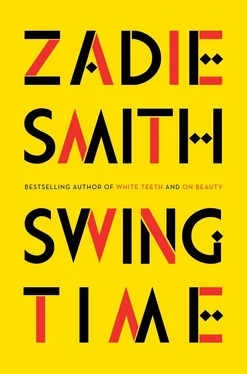“Good day to you. How is the day?”
“Oh, I see what’s happening here,” said Aimee to an ancient old woman who had been so bold as to put her arm around Aimee’s tiny waist. “You gals get to really talk to each other out here. No men in sight. Yeah, I can just imagine what goes on.”
The woman from DfID laughed too much. I thought of how little I could imagine of what went on. Even the simplest ideas I’d brought with me did not seem to work here when I tried to apply them. I was not, for example, standing at this moment in a field with my extended tribe, with my fellow black women. Here there was no such category. There were only the Sere women, the Wolof, and the Mandinka, the Serahuli, the Fula and the Jola, the last of whom, I was told once, grudgingly, I resembled, if only in basic facial architecture: same long nose, same cheekbones. From where I stood now I could hear the call to prayer coming from the square concrete minaret of the green mosque, rising above the trees and over this village where women covered and uncovered were sisters and cousins and friends to each other, were each other’s mothers and daughters, or were covered in the morning and uncovered in the afternoon, simply because some age mates had come visiting, boys and girls, and one of them had offered to plait their hair. Here where Christmas was celebrated with a startling fervor, and all the people of the book were considered “brothers, sisters,” while I, representing the utterly godless, was nobody’s enemy, no, just someone who should properly be pitied and protected — so one of the girls I shared a room with explained to me — as you would a calf whose mother died in the having of her.
Now I watched girls lining up at the well, filling their huge plastic tubs with water and then lifting these tubs on to their heads to begin the long walk back to the village. A few of them I recognized from the compound I had been staying in this past week. The twin cousins of my host, Hawa, as well as three of her sisters. I waved at them all, smiling. They acknowledged me with a nod.
“Yes, we’re always struck by how much the women and girls do here,” said the woman from DfID, sotto voce, following my line of sight. “They do the housework, you see, but then also all the field work, and as you’ll see it’s largely women running both the school and the market. Girl Power indeed.”
She bent down to feel the stem of a garden egg and Aimee took the opportunity to turn to me, cross her eyes and stick her tongue out. The DfID woman straightened up and glanced over at the growing queue of girls.
“Many of them should be in school, of course, but unfortunately their mothers need them here. Then you think of those young boys we just saw, lounging about in a hammock among the cashews…”
“Education is the answer to development for our girls and women,” Lamin piped up, with the slightly wounded and weary air, I thought, of someone who had endured a great many lectures from representatives of DfID. “Education, education, education.”
Aimee gave him a dazzling smile.
“That’s what we’re here for,” she said.
• • •
During all the activities of the day Aimee kept Lamin close, mistaking his tendency to whisper for a special intimacy between them, and after a while she began whispering back at him, flirting like a schoolgirl. Dangerous, I thought, in front of the ever-present journalist, but there was not a moment when we were alone that I could firmly tell her so. Instead I watched her struggling to restrain her impatience whenever poor Carrapichano had no choice but to draw her away from Lamin and back toward all the necessary mundane tasks of the day: signing papers, meeting ministers, discussing school fees, sustainability, curriculum, teachers’ pay. Half a dozen times he made Aimee and the rest of us stop where we were so that we might listen to yet another government functionary give yet another speech — about partnership and mutual respect, and in particular the respect the President-for-Life wanted passed on to Aimee in his absence, which itself was only the correct response owed for the respect Aimee “clearly does possess for our beloved President”—as we all stood suffering in the sun. Each speech was near-identical to the one before it, as if there were some ur-text back in the city from which all these ministers had been instructed to quote. As we approached the school, slowly, so as not to outpace the photographer — who scuttled backward before us — one of these ministers once more pressed Carrapichano’s hand, and when Carrapichano tried, quietly and out of Aimee’s sightline, to dissuade him, the minister refused to be dissuaded, standing his ground at the school gate, blocking the entrance and beginning his speech, upon which Aimee abruptly turned her back.
“Look, Fern, I don’t mean to be an asshole about it but I’m really trying to be present in this moment? And you’re making that very hard for me right now. It’s hot, we’re all hot, and I’m really mindful that we haven’t got a lot of time this time round. So I think we can put a hold on the speeches. I think we all know where we stand, we all feel welcomed, we all feel mutually respected or whatever. Right now I’m here to be present. No more speeches today — OK?”
Carrapichano looked down, half defeated, at his clipboard, and for a moment I thought he was about to lose his temper. Beside him the minister stood unperturbed, not having followed what Aimee had said, simply waiting for his cue to begin again.
“It is time to visit the school,” said Carrapichano, without looking up, reaching round the minister and pushing open the gate.
The nanny, Estelle, was there to meet us, with the children, and they ran through the mammoth sandy schoolyard — empty except for two bent and netless goal mouths — high-fiving any child who came near, delighted to be let loose among so many of their kind. Jay was eight at the time, and Kara six, they’d been home-tutored all their lives. As we passed through our whistle-stop tour of six large, hot, cheerily painted classrooms, their many childish questions came tumbling out, questions not unlike my own, but in their case unedited and unconsidered, and which their nanny kept trying, unsuccessfully, to hush and silence. I wished I could add to them. Why does the headmaster have two wives, why do some girls wear scarves and some not, why are all the books torn and dirty, why are they being taught in English if they don’t speak English at home, why do the teachers spell the words wrong on the board, if the new school is for girls what will happen to the boys?
Nine
Most Saturdays, as my own middle passage approached, I accompanied my mother to a protest march of one kind or another, against South Africa, against the government, against nuclear bombs, against racism, against cuts, against the deregulation of the banks or in support of the teachers’ union, the GLC or the IRA. The purpose of all this was hard for me to grasp, given the nature of our enemy. I saw her on television most days — rigid handbag, rigid hair, unturned, unturnable — and always unmoved by however many people my mother and her cronies had managed to gather to march, the previous Saturday morning, through Trafalgar Square and right up to her shiny black front door. I remember marching for the preservation of the Greater London Council, a year earlier, walking for what felt like days — half a mile behind my mother, who was up at the front, deep in conversation with Red Ken — carrying a placard above my head, and then, after that got too heavy, carrying it over my shoulder, like Jesus at the Crucifixion, lugging it down Whitehall, until finally, we got the bus home, collapsed in the lounge, switched on the TV and learned that the GLC had been abolished earlier that same day. Still I was told there was “no time for dancing” or, in a variation, that “this was not the time for dancing,” as if the historical moment itself forbade it. I had “responsibilities,” they were tied to my “intelligence,” which had been recently confirmed by a young supply teacher up at the school who had thought to ask our class to bring in “whatever we were reading at home.” It was one of those moments — there were many — when we, the students, were reminded of the fundamental innocence of our teachers. They gave us seeds in the spring to “plant in our gardens,” or asked us, after the summer break, to write a page about “where you went on holiday.” It wasn’t something that hurt me: I’d been to Brighton, many times, and once on a booze cruise to France, and was a keen window-box gardener. But what about the gypsy girl who smelled, who had weeping sores around her mouth and a weekly black eye? Or the twins, too old and dark for adoption, who bounced around the local foster homes? What about the boy with the eczema, whom Tracey and I spotted through the bars of Queen’s Park one summer night, alone, fast asleep, on a bench? Supply teachers were the most innocent of them all. I remember the surprise of this one at the not small number of children who brought in either the Radio or TV Times .
Читать дальше












